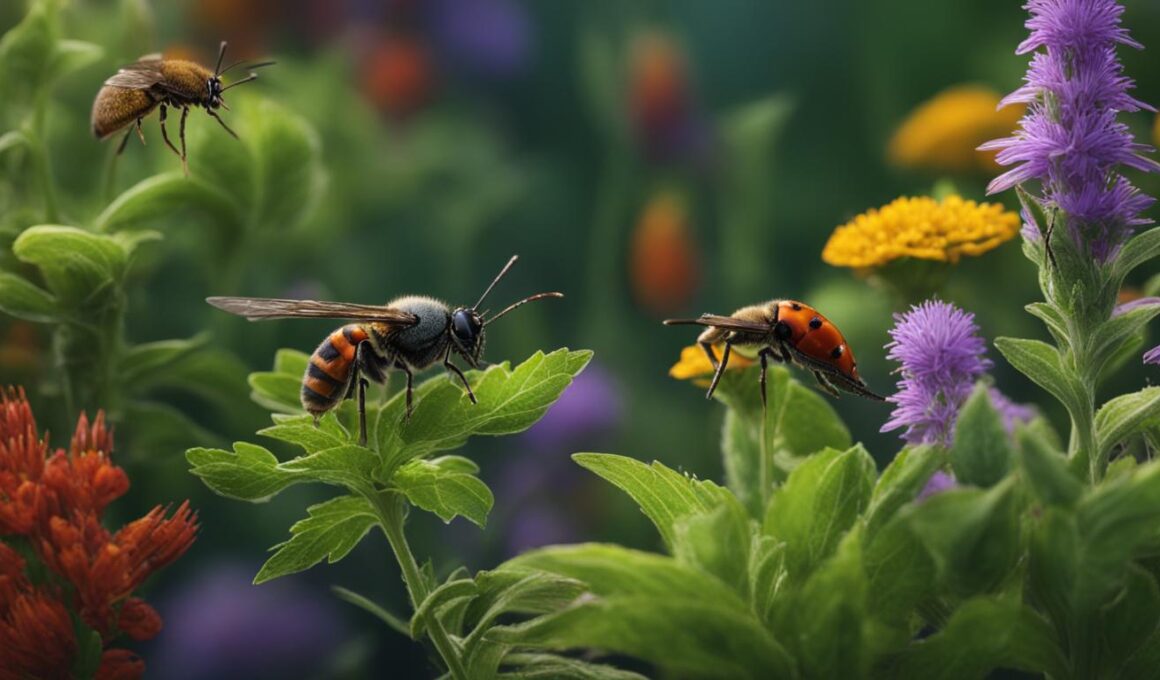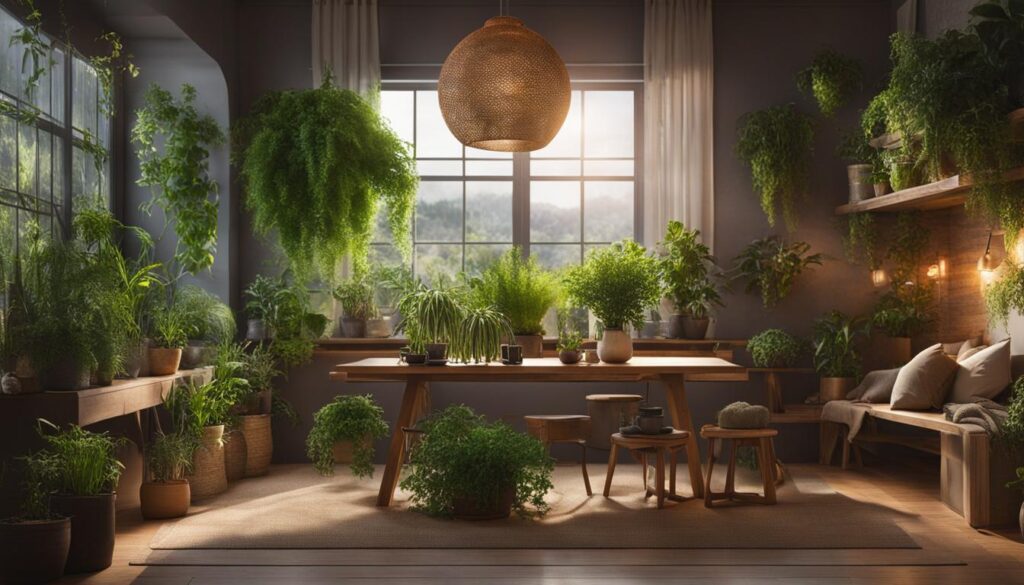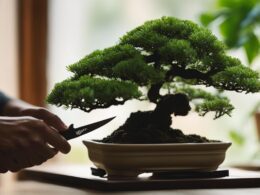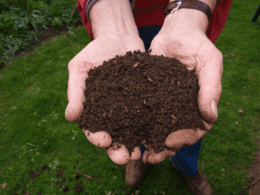Growing herb plants indoors offers numerous benefits, from year-round availability and control over the environment to natural air purification and mood enhancement. However, it’s important to consider whether certain herbs may attract unwanted bugs or pests to your indoor herb garden.
While most herbs are generally pest-resistant, there are exceptions to be aware of. Basil, in particular, is prone to attracting aphids, whiteflies, and other pests. On the other hand, herbs like oregano, thyme, rosemary, and sage are less likely to attract pests and may even repel them. By properly caring for your herb plants and researching the specific types you want to grow, you can maintain a beautiful and pest-free indoor herb garden.
Post Summary:
- Herb plants provide year-round availability, an indoor gardening option, and various other benefits.
- Basil is more likely to attract bugs and pests, while herbs like oregano, thyme, rosemary, and sage are generally pest-resistant.
- Proper care and research into the specific herbs you choose to grow can help you maintain a bug-free and healthy indoor herb garden.
- Regular inspection and timely action are crucial for pest control in your indoor herb garden.
- By selecting the right herb varieties, you can enjoy a beautiful and pest-free indoor herb garden.
The Benefits of Growing Herb Plants Indoors
Growing herb plants indoors provides several benefits. Firstly, they can be grown year-round, ensuring a constant supply of fresh herbs. Whether it’s winter or summer, you can enjoy the flavors and aromas of your favorite herbs whenever you want. Imagine adding a handful of freshly picked basil to your homemade pasta sauce, or sprinkling some fragrant rosemary on your roasted vegetables. With an indoor herb garden, you have an abundant supply of culinary delights at your fingertips.
Secondly, indoor gardening allows for better control over the environment. You can adjust the temperature, humidity, and lighting to create the optimal conditions for your herb plants to thrive. This level of control is especially beneficial if you live in an area with extreme weather conditions or limited outdoor space. You no longer have to worry about frost damaging your delicate herbs or scorching heat withering them away. Instead, you can create a customized microclimate that caters to the specific needs of each herb.
Additionally, herb plants act as natural air purifiers, enhancing the quality of the air in your indoor environment. As they grow, they absorb harmful toxins and release oxygen, improving the overall air quality. Breathing in clean, fresh air can have a positive impact on your mental well-being, reducing stress and promoting a sense of calm. The presence of greenery indoors has also been shown to boost mood and productivity, making your indoor herb garden a beautiful and beneficial addition to your home.
| Benefits of Growing Herb Plants Indoors | |
|---|---|
| Year-round availability of fresh herbs | Control over the environment |
| Natural air purification | Mood enhancement and mental health benefits |
| A versatile ingredient for cooking |
“Indoor gardening allows for better control over the environment, ensuring optimal conditions for your herb plants to thrive.”
Selecting the Right Herbs for Indoor Gardening
When choosing herbs to grow indoors, it’s important to consider their growth habits, care requirements, and pest resistance. Some herbs are more suitable for indoor cultivation than others. While basil may attract pests, other herbs like oregano, thyme, and rosemary are known for their pest-resistant qualities. These herbs not only add flavor and freshness to your dishes but also act as natural repellents for bugs and pests.
- Oregano: This herb is easy to grow indoors and is known for its robust flavor. It is resistant to many pests and can deter them from your indoor herb garden.
- Thyme: With its aromatic leaves and delicate flowers, thyme is a popular choice for indoor gardening. It thrives in well-drained soil and can withstand fluctuations in temperature and humidity.
- Rosemary: Known for its distinctive scent and flavor, rosemary is a versatile herb that adds a unique touch to various recipes. It requires bright light and moderate watering, making it well-suited for indoor cultivation.
By selecting the right herbs and providing them with the proper care, you can enjoy the benefits of growing herb plants indoors. With a little time and effort, you can create a thriving indoor herb garden that not only enhances your cooking but also contributes to a healthier and more enjoyable living space.
What to Consider Before Growing Herb Plants
Before you start growing herb plants, there are a few important factors to consider. These considerations will help you make informed decisions and ensure a successful herb garden. Whether you plan to grow herbs for decorative purposes or for culinary use, taking the time to research and plan ahead will greatly contribute to your gardening experience.
Attracting Bugs or Pests
The first consideration is whether you want to attract bugs or pests. If you’re growing herbs for decorative purposes, attracting bugs may not be a big concern. However, if you plan on using the herbs for cooking, it’s important to avoid attracting any unwanted pests. Different herbs have different levels of pest attraction, so it’s crucial to research the specific herb plant you want to grow. By selecting herbs that are less likely to attract bugs or pests, you can create a healthier environment for your plants.
Research and Planning
Research is key when it comes to growing herb plants successfully. Take the time to learn about the specific herb varieties you’re interested in. Understand their growth requirements, including sunlight, watering, and soil conditions. This knowledge will help you create an ideal environment for your herb plants to thrive and prevent potential pest problems. Planning ahead also involves choosing the right location for your indoor herb garden, whether it’s a windowsill, balcony, or dedicated grow light setup. Ensure that your chosen location provides adequate light and ventilation for your plants.
In addition to research and planning, it’s beneficial to consider companion planting. Some herbs have natural pest-repellent properties and can be strategically planted alongside other herbs or vegetables to promote a pest-free environment. For example, planting rosemary near cabbage can help deter cabbage worms. Understanding and implementing companion planting techniques can contribute to the overall health and success of your herb garden.
By considering factors such as pest attraction, doing thorough research, and planning ahead, you can set yourself up for a rewarding and pest-free herb gardening experience. These considerations will guide you in selecting the right herbs, creating the optimal growing conditions, and maintaining a beautiful and thriving indoor herb garden.
| Herb | Pest Attraction |
|---|---|
| Basil | Attracts aphids and whiteflies |
| Oregano | Less likely to attract pests |
| Thyme | Less likely to attract pests |
| Rosemary | Less likely to attract pests |
| Sage | Less likely to attract pests |
Do Herbs Attract Bugs or Pests?
In general, herbs are pest-resistant and do not attract many bugs or pests. However, basil is an exception and is particularly prone to attracting aphids, whiteflies, and other pests. Regular inspection of basil plants is recommended to catch any problems early and take appropriate action. Other indoor herbs like oregano, thyme, rosemary, and sage are less likely to attract pests, making them a safer choice for a bug-free herb garden. By selecting the right herbs and staying vigilant, you can minimize the risk of attracting bugs or pests.
Table 1: Pest-Prone Herbs and Pest-Resistant Herbs
| Pest-Prone Herbs | Pest-Resistant Herbs |
|---|---|
| Basil | Oregano |
| – | Thyme |
| – | Rosemary |
| – | Sage |
As shown in Table 1, basil is a pest-prone herb, while oregano, thyme, rosemary, and sage are pest-resistant. This highlights the importance of choosing the right herbs for your indoor garden to avoid attracting unwanted bugs or pests.
“Proper care and research into the type of herb you want to grow can help you maintain a beautiful and pest-free indoor herb garden.”
By following proper care techniques and conducting thorough research on the herbs you plan to grow, you can create a healthy and pest-free environment for your indoor herb garden. Regular monitoring, timely action, and implementing pest control measures when necessary will help ensure the success of your herb-growing endeavors.
Different Types of Indoor Herbs and If They Attract Bugs or Not
When it comes to growing indoor herbs, it’s important to choose the right varieties that are less likely to attract bugs or pests. While basil is known for its pest-prone nature, there are several other herbs that can thrive indoors without inviting unwanted guests. Let’s explore some of these herbs and their pest-resistance qualities.
Oregano
Oregano is a popular herb that not only adds flavor to your dishes but also repels pests. Its strong aroma acts as a natural deterrent to bugs, making it an excellent choice for a bug-free indoor herb garden. With its low susceptibility to pests, oregano is a reliable herb to grow indoors.
Thyme
Thyme is another versatile herb that is known for its ability to resist pests. Its natural oils have insect-repelling properties, making it an effective deterrent for bugs. With its compact growth habit and aromatic leaves, thyme is a great addition to any indoor herb garden.
Mint
Mint is not only known for its refreshing taste but also its ability to repel pests. Its strong scent acts as a natural deterrent for insects, keeping them away from your indoor garden. Mint is a fast-growing herb that can quickly fill your space with its delightful fragrance while keeping the bugs at bay.
| Herb | Pest Attraction |
|---|---|
| Basil | Attracts aphids, whiteflies, and other pests |
| Oregano | Resistant to pests |
| Thyme | Resistant to pests |
| Mint | Repels pests |
By selecting herbs like oregano, thyme, and mint for your indoor garden, you can enjoy the benefits of fresh herbs without worrying about attracting bugs or pests. Their pest-resistant qualities make them a reliable choice for an indoor herb garden that thrives in a bug-free environment.
Conclusion
Growing herb plants indoors offers a bug-free and pest-free option for your indoor gardening needs. By implementing proper pest control measures and selecting the right herb varieties, you can ensure a healthy and vibrant herb garden without any unwelcome guests. Regular monitoring and timely action are key to maintaining bug-free herb plants.
Remember to prioritize plant care techniques such as proper watering, adequate lighting, and appropriate soil conditions. These factors contribute to the overall health and vitality of your herb plants, making them less susceptible to pests. By providing your herbs with optimal growing conditions, you can enjoy a pest-free garden all year round.
Indoor herb gardening not only provides fresh and flavorful herbs for your culinary creations but also enhances the ambiance of your space. With proper pest control and care, you can reap the rewards of a bug-free herb garden and enjoy the benefits of indoor gardening. So, go ahead and start your own indoor herb garden, knowing that it can thrive without any unwelcome pests.
FAQ
Do herb plants attract bugs or pests?
While most herbs are pest-resistant, some herbs, like basil, are more prone to attracting bugs and pests. Other herbs like oregano, thyme, rosemary, and sage are less likely to attract pests and may even repel them.
What are the benefits of growing herb plants indoors?
Growing herb plants indoors offers year-round availability, control over the environment, natural air purification, mood enhancement, and culinary use.
What should I consider before growing herb plants?
It’s important to consider whether you want to attract bugs or pests, and if you’re growing herbs for decorative purposes or culinary use. Researching the specific herb plant you want to grow is also important, as some herbs are more likely to attract bugs than others.
Which herbs are more likely to attract bugs or pests?
Basil is particularly prone to attracting aphids, whiteflies, and other pests. Other indoor herbs like oregano, thyme, rosemary, and sage are less likely to attract pests.
Do indoor herbs attract bugs or pests?
While basil is more likely to attract bugs, other indoor herbs like oregano, thyme, and rosemary are known for their pest-resistant qualities and are less prone to pest infestations. Mint is another herb that repels pests.
Can I grow herb plants indoors without attracting bugs or pests?
By implementing proper pest control measures, selecting pest-resistant herb varieties, and regularly monitoring and caring for your plants, you can maintain a bug-free and pest-free indoor herb garden.










